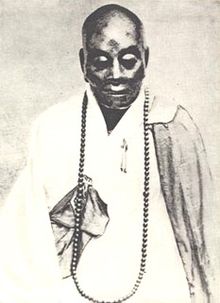Huineng
Huineng ( Chinese 慧能 / 惠 能 , Pinyin Huìnéng , W.-G. Hui-neng ; Japanese曹 渓 慧能, Daikan Enō ; * 638 ; † 713 ) was a Chinese master of Chan Buddhism. He is considered one of the most important figures in the entire Zen tradition.
Huineng is the sixth (last) Dharma ancestor of Chan / Zen Buddhism in the (historically unproven) successor line from Bodhidharma . He is considered to be the author of the Platform Sutra of the Sixth Dharma Ancestor (六祖壇經), which was of great importance for the development of the 'Southern School' of the Chan. This sutra also contains the biographical data.
Life
Master known as Huineng was born in 638 in Guangzhou , South China to the Lu family. After the early death of his father, the boy took care of the family's livelihood by collecting wood and did not learn to read or write. One day, while delivering firewood to an inn, he heard a guest reciting the Diamond Sutra and had an awakening experience. He ensured his mother's supply and set out north to practice the Buddhahood with a master.
When he arrived at the monastery of Hongren , the Fifth Dharma Ancestor, he was assigned a place in the kitchen, where he was busy peeling rice and collecting firewood. One day Hongren asked the monks to express their understanding in a poem ( gatha ). He would give the insignia of Master to one who could manifest the understanding of the essence of the teaching. All the monks were convinced that Shenxiu , the chief monk, had the most profound understanding and refrained from composing a poem.
Shenxiu wrote the following verse on the monastery walls:
The body is the bodhi tree.
The mind is like a clear standing mirror.
Polish it with zeal at all times.
Let no dust adhere to it
The Dharma ancestor attested to the Shenxiu that he had reached the outer gate of knowledge but had not yet entered.
All the monks read the gatha with admiration and repeated it. This is what Huineng heard. Huineng had the Gatha read to him again, composed a verse himself, and asked an officer passing by to write it next to it:
Basically there is no Bodhi tree
There is no clear mirror on a frame
In the origin there is no thing on
which dust should lie
When the Fifth Dharma Ancestor saw this gatha, he wiped it off with his shoe so as not to stir up jealousy among the educated monks. He later visited Huineng in the rice mill, secretly handed him the robe at midnight and made him the Sixth Dharma Successor . Huineng left the monastery with the order not to appear as a teacher for a few years and finally to teach the people of the (barbaric) south. He is considered to be the founder of the Southern School of Chan, which is also called the School of Sudden Enlightenment .
Numerous legends and dialogues are still associated with the person of Huineng.
literature
- Heinrich Dumoulin : The enlightenment path of Zen in Buddhism. Frankfurt a. M. 1976.
- Gao Xingjian (Nobel Prize for Literature): Snow in August , play, 1997
- Hui Neng (Wei Lang): The Sutra of the Sixth Patriarch. OW Barth Verlag (or Origo Verlag)
- Jorgensen, John (2005), Inventing Hui-neng, the Sixth Patriarch Hagiography and Biography in Early Ch'an, Leiden: Brill
- Pine, Red. The Platform Sutra: The Zen Teaching of Hui-Neng. (2006) Counterpoint. ISBN 1-59376-177-5 .
- Buddhist Text Translation Society The Sixth Patriarch´s Dharma Jewel Platform Sutra . 1977
- McRae, John (2000). The Platform Sutra of the Sixth Patriarch. Translated from the Chinese of Zongbao ( Memento from August 22, 2012 in the Internet Archive ) (PDF), Berkeley: Numata Center for Buddhist Translation and Research
Web links
- Literature by and about Huineng in the catalog of the German National Library
- John M. Thompson: Huineng. In: Internet Encyclopedia of Philosophy .
- English online version of the Platform Sutra - translated by C. Humphreys and Wong Mou-Lam
- Legends in Chan: the Northern / Southern Split, Hui-neng and the Platform Sutra - English (PDF file; 152 kB)
- On the High Seat of "The Treasure of the Law" The Sutra of the 6th Patriarch, Hui Neng - English
| personal data | |
|---|---|
| SURNAME | Huineng |
| ALTERNATIVE NAMES | 慧能 (Chinese); 惠 能 (Chinese); Huìnéng (pinyin); Hui-neng (Wade-Giles); 曹 渓 慧能 (Japanese); Daikan Enō (Japanese) |
| BRIEF DESCRIPTION | Chinese master of Chan Buddhism |
| DATE OF BIRTH | 638 |
| PLACE OF BIRTH | Guangzhou (Canton) |
| DATE OF DEATH | 713 |


